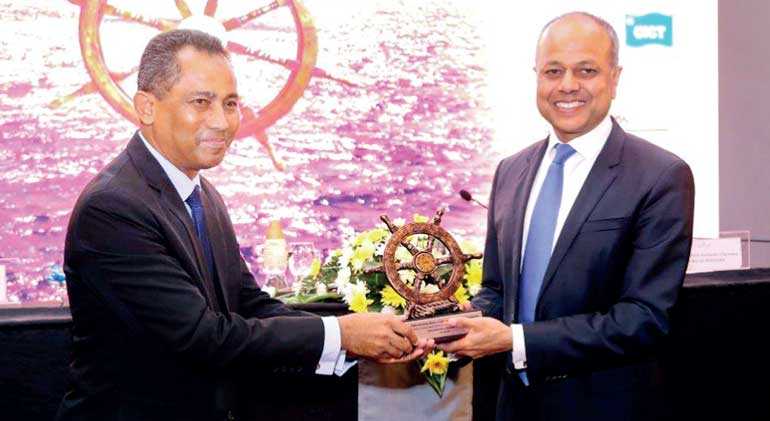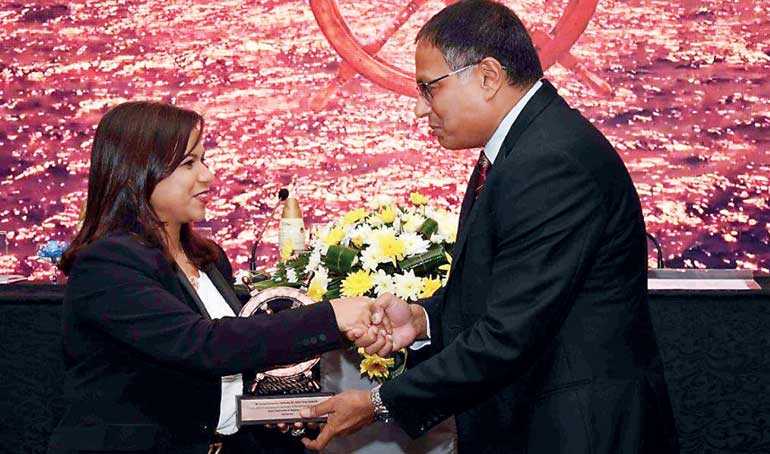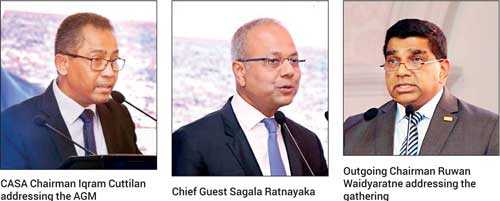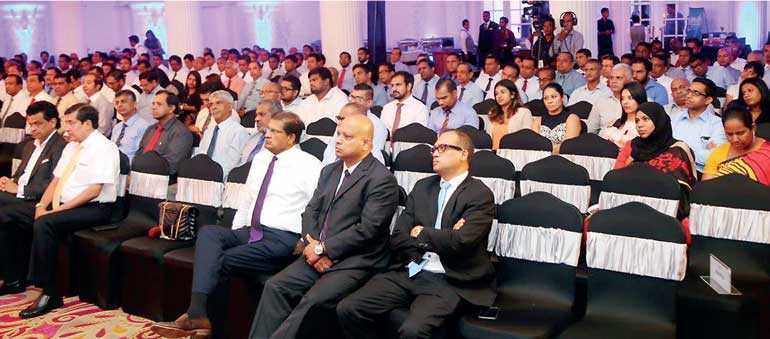Tuesday Feb 24, 2026
Tuesday Feb 24, 2026
Monday, 22 July 2019 00:00 - - {{hitsCtrl.values.hits}}

Seated from left: CASA Treasurer Shano Sabar, SLPA Chairman Kavan Ratnayaka, CASA Chairman Iqram Cuttilan, Ports and Shipping and Southern Development Minister Sagala Ratnayaka, CASA Immediate Past Chairman Ruwan Waidyaratne, CASA Vice Chairperson Shehara Jayawardana and CASA Secretary General Ralph Anandappa. Standing from left: Ananda Senanayake (Simatech), Mevan Peiris (Ceyline), Nimal Ranchigoda (Malship), Ranjan Ratnasingham (BTL), Janesh Ratnadasa (Asha Shipping), Preethilal Fernando (Hemas), Ananda Ranasinghe (Marine International), Nihal Dharmaprya (CSC) and Prasad Jinadasa (Setmil)

Iqram Cuttilan presenting a token of appreciation to Sagala Ratnayaka

Shehara Jayawardena presenting a token of appreciation to Kavan Ratnayaka
Ceylon Association of Shipping Agents (CASA) held its 53rd Annual General Meeting on 12 July at the Kingsbury. The Chief Guest for the occasion was Ports and Shipping and Southern Development Minister Sagala Ratnayaka. The event was also graced by Sri Lanka Ports Authority (SLPA)Chairman Kavan Ratnayaka and many other dignitaries from the shipping and logistics industry.
Aitken Spence Shipping Ltd. Managing Director Iqram Cuttilan was elected the new Chairman for the year 2019/2020. McLarens Holdings Ltd. Group Joint Managing Director Shehara JayawardanaandHayleys Advantis Ltd. Group Director Shano Sabar were appointed as Vice Chairperson and Treasurer respectively.
The Executive Committee elected for the period 2019/2020 comprises Asha Shipping Ltd., BTL Lanka Ltd., Ceyline Agencies Ltd., Ceylon Shipping Corporation Ltd., Hemas Maritime Ltd., Malship (Ceylon) Ltd., Marine International Agencies Ltd., Setmil United Cargo Ltd. and Simatech Marine Lanka Ltd. 
Challenges ahead
Speaking at the event Iqram Cuttilan spoke of the key challenges faced by the Shipping industry. “The Shipping industry has been facing numerous challenges during the past decade. The overcapacity resulting in lower freight rates, rising bunker and operational costs, the new regulations being imposed by IMO and other bodies, the advancement in technology, anticompetitive regulations, tariff barriers, trade wars, etc.have put tremendous pressure on shipping lines just to stay afloat. For the Shipping Lines to survive, they have formed three mega consortia so that they could pool resources and benefit by the economy of scale. This has resulted in the top 8-10 lines carrying 90% of the cargo movementworldwide.
“Shipping lines upsizing their fleets to benefit by the economies of scale also brings challenges and competition amongst ports. These large vessels will call at a few ports thus to ensure that these vessels call at Colombo, we need to have the capacity, efficiency, offer fast turnaround times as well as ensure there is ease of doing business,” he stated.
Fast-tracking East Container Terminal
In his speech he elaborated the importance of fast-tracking the East Container Terminal. “The Port of Colombo,with itsclose proximity to the main East West trade lane has benefited due to our geographic location.The Port of Colombo recorded a throughput of over seven million TEUS in 2018. We congratulate the SLPA (JCT), SAGT and CICT for this remarkable achievement. However, for Colombo to remain competitive and grow further we just cannot only rely on our geographic location.
“We need to build capacity. The Colombo Port Expansion project and the construction of the South Terminal now called CICT, increased the competitiveness of Colombo and attracted the larger vessels due to the deep draft we could offer. It is five years since CICT was operational and to date we have not been able to build on that. What is unfortunate is that despite 450 m of quay length of East Terminal having been built as well as the yard area, the terminal is not being made use for the purpose it was built. It is very unfortunate that this facility has been lying idle for five years due to indecisiveness.
“The need of hour is to operationalise ECT immediately so that we don’t lose outand we capitalise on our geographic location. With the Indian Government paying great emphasis on the development of deep water ports, this is a threat to Colombo. So unless we continue adding deep draft capacity in Colombo, we are going to be the losers. The fall out of this will be that the service strings which have Mega vessels not calling at Colombo which will result in stagnation of volume growth as well as our importers and exporters not being able to secure space for their cargoes as well as enjoy the competitive freight rates.
“Hon. Minister we are aware that under your leadership the Government has decided to jointly operate ECT with Japanese, Indian and Sri Lankan participation, but what we as the industry are requesting you is to fast-track this and operationalise the terminal urgently.The Government and the SLPA developed theNational Port Master plan and we hope that the proposals submitted in the master plan will be acted upon.”
From a transshipment hub to a maritime hub
Sri Lanka has to grow from a transshipment hub to a maritime hub. For this to happen we need to simplify processes, cut down red tape, andimprove the ease of doing business indices.Digitisation plays a significant role in achieving the above.
The establishing of the National Single Window, E-clearance of cargo and vessels, Electronic payment etc. needs to be fast tracked so that efficiency can be brought about. Whilst the Government has taken certain initiatives in establishing the above the process is quite slow. CASA will fully support these initiatives.

“To be a maritime hub we also need to focus on developing the Passenger Cruise business, Break Bulk and Bulk cargo industry, promoting the handlingof Multi country consolidation, Entrepot trading, bunkering, ship repair and numerous other ancillary services. We have to invest on providing facilities and create required business friendly regulatory framework to carry out the above activities as well as simplifying processes and cutting out the red tape.
“The myth of making Sri Lanka a maritime hubby getting more services to call at Colombo and increasing transshipment volume by liberalising foreign shareholding in the shipping agency business is very much alive. Hon. Minister we thank you for understanding the actual position of the shipping industry and not bowing down to the pressures exerted by interested parties.
The initiative taken by CASA on anticorruption and zero tolerance has been quite successful. We wish to thank the SLPA and the Sri Lanka Customs for their support in adopting this.”
Vision
Articulating his vision for CASA Cuttilan said he wishes to take CASA forward as the voice of the shipping industry and will work very closely with our members and stakeholders in promoting the maritime hub concept. He stated that he will actively engage with other industry associations such as SLAVO, SLAFFA, SLANA, CEYFA, etc. as well as the SLPA, the three container terminals,HIPG,Government and other non-governmental and private sector agencies to promote the ease of doing business and reduce the barriers that are impeding the growth of Maritime and logistics industry.
“We are well aware that we have a large number of small and medium scale agents. We will engage with them frequently to assist them to develop their business activities and actively contribute towards the industry,” he said.